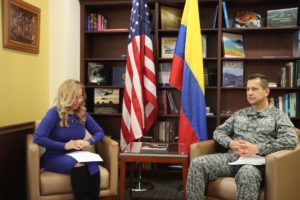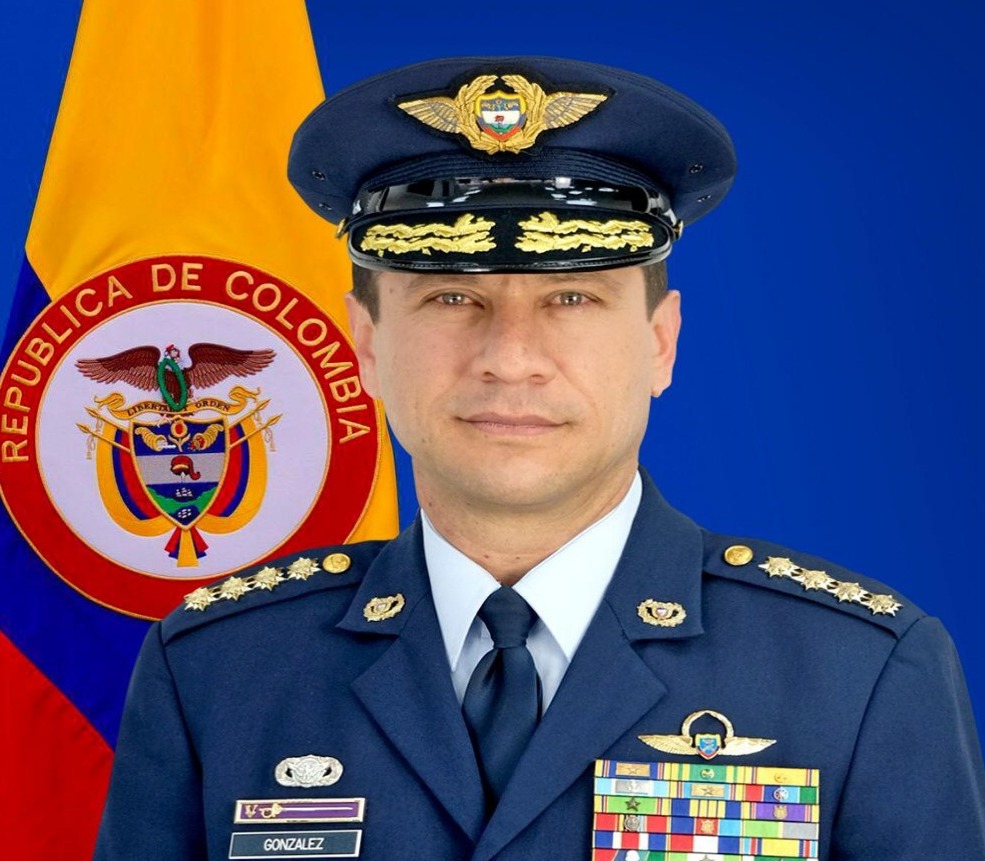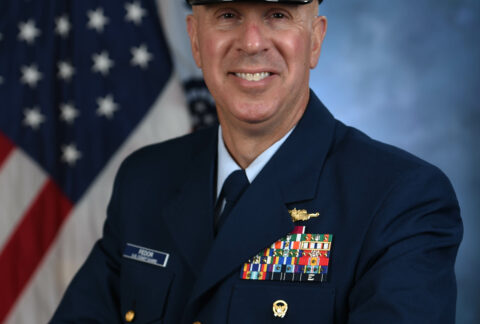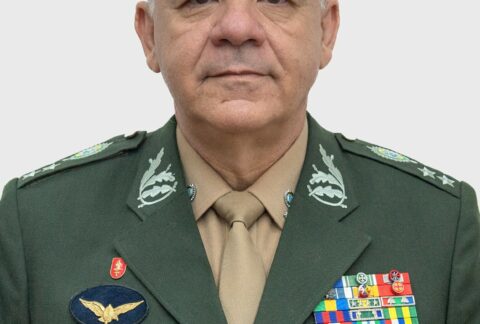General Jorge León González Parra, chairman of the Joint Chiefs of Staff of the Colombian Military Forces, spoke with Diálogo during his official visit to U.S. Southern Command (SOUTHCOM) in Miami. During the interview, Gen. González spoke about Colombia’s advances in the fight against criminal organizations, expert exchanges on information capabilities, and the important role of citizens in national security.
Diálogo: What results did the Colombian Military Forces deliver in the fight against transnational criminal organizations, especially narcotrafficking?
General Jorge León González Parra, chairman of the Joint Chiefs of Staff of the Colombian Military Forces: We had historic results in 2021, which no other government has had. We have several lines of action to confront narcotrafficking, such as eradication. Last year, the eradication goal was 103,000 hectares and in 2020, 130,000 hectares, and we achieved it; and this year the goal is 100,000 hectares.
We have also been attacking the entire narcotrafficking value chain, from planting to commercialization, and this has given us very positive results. We have seized liquid and solid chemical precursors, which are used to produce coca paste and cocaine hydrochloride, and our intelligence is focused on locating cocaine hydrochloride laboratories. In 2021, more than 5,700 laboratories were destroyed, and more than 600 tons of cocaine seized, a historic figure in Colombia; and we have carried out two regional campaigns that have helped us a lot to reduce the revenues of these illicit economies: The Orion and Zeus campaigns. Orion is led by the Colombian Navy, which started in 2018 with eight countries, eight institutions; and in 2021 we ended up with 40 countries, 102 institutions, and some countries in Europe. Last year, for example, 262 tons of cocaine hydrochloride were seized in the Orion Campaign. For its part, the Zeus strategy that began operations in 2019 and is led by the Colombian Air Force, has made interdiction agreements with five countries in the region to detect illegal border crossings of aircraft, affecting 48 aircraft, [with] 38 landing strips neutralized, four aircraft immobilized, and 22 tons of cocaine seized. With regard to organized armed groups, more than 5,000 of their members were neutralized in 2021 between captures, surrenders, demobilizations, and those killed in military operations, highlighting the priority in captures (4,748).
Diálogo: What joint and combined work initiatives are the Colombian Military Forces carrying out through the Joint Chiefs of Staff to counteract these criminal organizations?
Gen. González: One of the policies of the government of President [Iván] Duque has been to strengthen joint operations between the military forces and in coordination with the national police and interinstitutional operations with [Colombia’s] Office of the Attorney General, because it allows us to prosecute the criminals who belong to these organizations. This policy of joint work has guaranteed us to be more successful, because those individual efforts that we made in the past were very dispersed; when we work together to plan and execute operations, we optimize the efforts and capabilities to hit these terrorist organizations more effectively and forcefully.
As for combined work initiatives, we have the Orion Campaign and the Zeus strategy already explained in the previous question, in addition to and through diplomacy for defense based on dialogue and multilateral cooperation, through confidence-building mechanisms such as the senior commanders talks, the Binational Border Commissions (COMBIFRON, in Spanish), and meetings of regional border commanders, among others, which are led through the Joint Chiefs of Staff.
Diálogo: SOUTHCOM has carried out expert exchanges in information capabilities with the Colombian Military Forces. Do you believe that these exchanges strengthen the capabilities of the military forces?
Gen. González: Our efforts were scattered in different units, but for the last two years SOUTHCOM and the South Carolina National Guard have been advising us to strengthen this capacity in information operations and to be able to counter disinformation. We realized in 2021 with the peaceful public demonstration that turned into violent riots, destroying public and private property, that false messages were disseminated to delegitimize the Public Force in its actions and influence the collective thinking of the national and international community — generating misleading perceptions of ungovernability — and with the limited information capabilities we have, we were able to move forward with the truth, not twisted as some sectors of society were presenting it. We are at this moment implementing the joint information operations capabilities center, which is precisely going to allow us to counteract that false news.
Diálogo: What new cooperation agreements are the Colombian Military Forces making with their counterparts in the United States?
Gen. González: We have cooperation above all in information and intelligence exchange to confront the worst threat: “narcotrafficking,” because the drug problem in Colombia is not only a national problem but a global problem, and that’s where Colombia has worked hard with the support of the United States and the integration of other countries that are interested in combating this transnational threat that generates violence, corruption, a culture of illegality, forced displacement, and affects healthy coexistence. We also have the United States-Colombia Action Plan (USCAP), which is under constant review and allows us to strengthen military capabilities to consolidate security not only in Colombia but in the region.

Today, January 27 [2022], at the end of the bilateral dialogues, a historic commitment to cooperation was signed, a Memorandum of Understanding between SOUTHCOM and the Colombian Military Forces’ General Command, which contains the pillars of regional security, emerging threats, and cyber and information operations, which goal is to strengthen security and defense efforts to counter common threats.
Diálogo: What are the threats from Venezuela, including the growing flow of narcotrafficking, which affect stability and security in Colombia?
Gen. González: Unfortunately, there are no diplomatic, commercial, or military relations with Venezuela, which makes this fight difficult for us, because generally with our neighbors, we generate a synergy that allows us to confront threats. The Venezuelan regime allows the presence and protects organized armed groups in its territory. For example, the ELN [National Liberation Army] has 23 percent of its members and the residual organized armed group of the extinct FARC [Revolutionary Armed Forces of Colombia] has 18 percent [of its members] in Venezuela, and from there they plan criminal actions to be executed in Colombia. Nevertheless, we have a strategy to confront this threat. But what is happening today is that the confrontation between these groups, in order to dominate narcotrafficking routes and take over the business, generates killings, displacement, and a lot of anxiety among border communities.
Diálogo: What progress has the Colombian Military Forces made in the area of gender?
Gen. González: In 2021, we created gender offices in the Military Forces’ General Command and in each of the forces. We have issued policies within the forces to strengthen the inclusion of women in military ranks, and protocols for sexual violence prevention and response. I consider that women are very well positioned, they have the same opportunities as men, because they are promoted just like us and have the same ranks; and if we talk about income they earn by rank, [it’s] the same as men.
There is no difference here. We have two modalities or two lines where they enter, which are the administrative corps, which are professionals who enter to perform in each of their fields; and we have the regular courses, which are of three and four years in some training schools, who will be future commanders and generals of the military forces. Today there are two generals, one who is a doctor and another who is a lawyer.
Diálogo: What is the contribution of the recently created Command against Drug Trafficking and Transnational Threats (CONAT, in Spanish) to the national effort in the fight against narcotrafficking?
Gen. González: This is a capacity that was strengthened in the Army. CONAT is organized in five brigades: The Brigade against the Illegal Exploitation of Mining Deposits, because criminals saw another source of resources to the detriment of the environment. They also have the Deployment Force against Transnational Threats, which has special forces operations capabilities to neutralize the structures of organized armed groups, and three Brigades against Narcorafficking, which attack the entire value chain of drug trafficking. This effort has been very important for the fight against narcotrafficking and the protection of the environment in Colombia.
Diálogo: How can you consolidate a culture of citizens reporting crime in order to provide greater security?
Gen. González: The information that citizens provide is very important for us, because it allows us to focus our operations. We have the civic engagement network per the government of President Duque, in which we count on citizens to alert us with specific information, and thus anticipate criminal and terrorist actions of these criminal organizations in many areas of the country. How do we create trust so that the community gives us information? One is by acting with timeliness and efficiency in operations, and for them [the citizens] also to see that the justice system is acting to identify, prosecute, and capture criminals. This relationship between the community and the Military Forces is helping us a lot to obtain important results.









